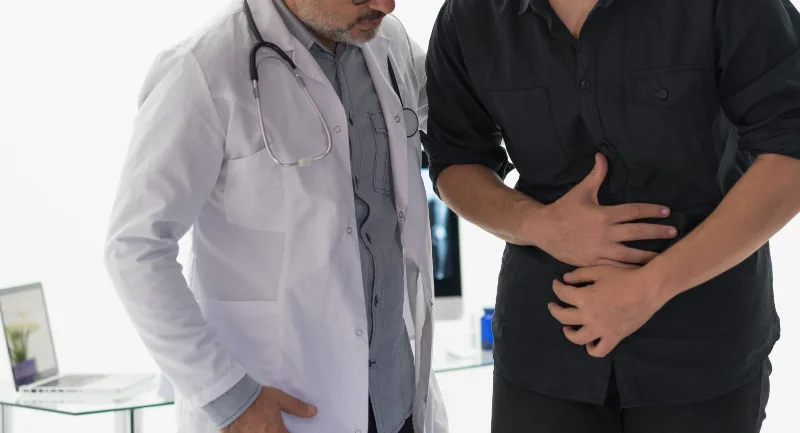Nobody knows what triggers the body to recognize its lining as foreign. There are thought to be genetic factors as well as exposure to an inciting stimulus that “turn on” the immune system. Both UC and Crohn’s are less prevalent in countries where food sources are less sterile/processed. Industrialized diet, smoking, antibiotics, and stress all may play some role. About 15-30% of patients have other family members afflicted.
Ulcerative colitis involves inflammation that starts in the rectum and the more superficial layers of the wall extending up the colon. The disease varies from Ulcerative Proctitis involving the rectum to left sided UC or Pan-Ulcerative Colitis if it involves the whole colon. Treatments will vary depending on the amount of tissue involved.
Because of the chronic nature of this condition, the disease rarely “goes away”, although with age it can “burn itself out”, becoming less prominent over time.


Most often, symptoms of Ulcerative Colitis involve rectal bleeding and pain. Despite treatment, these episodes will exacerbate or “flare”, and then go away for weeks or months. Initial symptoms can be vague and mimic intestinal flu, so diagnosis is often delayed.
Your primary care provider or gastroenterologist may order stool studies to rule out infection and look for parasites and white blood cells.
X-rays or CT scans can be helpful and appraising the level of involvement.
A colonoscopy will be required to check the appearance of the inflammation in the colon and obtain confirmatory biopsies.
There may be blood markers and measure of inflammation that can be checked. For example, a C-reactive protein is a blood marker that corresponds to the overall inflammation in the body (also increases with COVID), and fecal calprotectin levels use the stool to answer the same question. These can be used to monitor for treatment too.
Your gastroenterologist will want to check your colon periodically to look for cancer and other lesions. The risk is about 8% after 20 years and 18% after 30 years.
There are several non-pharmacologic treatments:
Drugs such as steroids can calm down the inflammation but typically the disease reflares when they are stopped. The same is true of antibiotics.
Special preparations of aspirin like drugs, mesalamine, can be used to calm inflammation. These often require pills once or several times per day.
Immunomodulating agents like methotrexate and azothioprine can work like chemotherapy to blunt the immune response to the gut lining, This has to be balanced against the risk of infection and toxicity.
Newer agents such as biologics like Infliximab (Remicade), Adalimumab (Humira), Vedolizumab (Entyvio), Ustekinumab (Stelara) and Tofacitinib (Xeljanz) can modify the immune response to the disease.
About 20% of UC patients end up requiring surgery if no relief with medications is seen.
See your local gastroenterologist to help make the diagnosis and start you on a therapy that is right for you. Our goal is give you therapy that results in long-lasting remissions, maintenance of your independence, and a better quality of life while minimizing medication side effects.
Visit these websites:
©2022 Copyright | Website Privacy Policy | Digital Marketing by Authority Solutions®